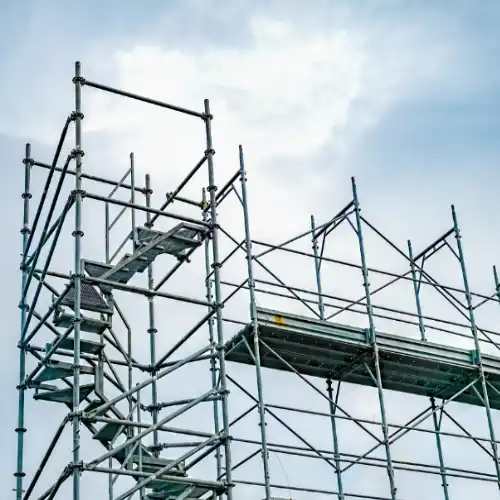OSHA’s #7 Most Cited Violation of 2025: Scaffolding (1926.451)
Why Scaffolding Hazards Continue to Rise — and How to Stay Compliant Scaffolding remains one of the most dangerous work environments across construction sites. In FY 2025, OSHA issued 1,905 citations under 1926.451, placing Scaffolding at #7 on the Top 10 list — with 32 more violations than the previous year.

Despite decades of training, updated standards, and improved equipment, scaffolding continues to contribute to falls, struck-by incidents, and structural failures. For safety leaders like Steve, purchasing agents like Alex, and plant managers like Pete, these violations reveal where oversight and training still fall short.
Why Scaffolding Violations Keep Happening
Even on well-managed sites, OSHA finds recurring patterns each year.
1. Missing or Improper Guardrails
Guardrails are essential for preventing falls, yet OSHA frequently cites scaffolds with:
-
Missing top rails
-
Missing midrails
-
Missing toe boards
-
Incorrect rail heights
-
Damaged or unstable guardrail systems
One missing rail = multiple citations.
2. Unsafe Access to Platforms
Workers often reach platforms by:
-
Climbing cross braces
-
Jumping between levels
-
Using unstable ladders or makeshift access
OSHA requires safe access, including:
-
Stair towers
-
Ladders
-
Ramps
-
Walkways
Improper access remains one of the most common violations.
3. Unstable Footing & Improper Base Support
Cited hazards include:
-
Missing base plates
-
No mudsills
-
Scaffolds set on bricks, blocks, or debris
-
Uneven surfaces
-
No tie-offs or bracing
A scaffold is safe only when properly leveled and supported.
4. Damaged, Overloaded, or Misaligned Planks
Planking issues account for a large portion of citations:
-
Cracked or split planks
-
Unsupported ends
-
Gaps exceeding OSHA limits
-
Overloading platforms
-
Using non-rated materials
A single weak plank can lead to collapse.
5. Lack of Fall Protection Above 10 Feet
When scaffolds exceed 10 feet, OSHA requires:
-
Guardrail systems and/or
-
Personal fall arrest systems
Common issues:
-
No anchor points
-
Workers not tied off
-
Removed or modified guardrails
-
No training on when fall protection is required
6. Insufficient Competent Person Oversight
OSHA mandates that a competent person:
-
Trains workers
-
Supervises erection, dismantling, and modifications
-
Inspects scaffolds before every shift
-
Identifies hazards and makes corrections immediately
Missing documentation = automatic citations.
How to Stay Compliant with 1926.451
✔ Conduct Daily Inspections
Performed by a trained competent person and documented every shift.
✔ Install Complete Guardrail Systems
Top rails, midrails, and toe boards — no exceptions.
✔ Provide Safe Access
No climbing frames. Provide stair towers, ladders, or ramps.
✔ Use Rated, Proper Planking
Follow ANSI ratings and manufacturer load requirements.
✔ Enforce Fall Protection
Above 10 feet, ensure workers have:
-
Guardrails
-
Harnesses
-
SRLs or lanyards
-
Anchor points
Train and Retrain Workers
Training must include:
-
Load capacities
-
Assembly & dismantling
-
Electrical hazards
-
Fall protection
-
Scaffold use rules
Keep training records organized and up to date.
How Advanced Safety & Industrial Supply Helps
At Advanced Safety & Industrial Supply, we provide everything your team needs for scaffolding safety and compliance:
✅ Fall protection PPE, harnesses, SRLs, and anchorage points
✅ Scaffolding safety audits & hazard assessments
✅ Competent person training
✅ Customizable onsite safety training
✅ Jobsite inspections & mock OSHA audits
✅ Comprehensive PPE sourcing for construction crews
Let our safety experts help reduce your risk and strengthen your compliance with OSHA 1926.451.
Contact us at (615) 739-3278 or visit AdvancedSafetySupply.com to schedule a scaffolding safety review.
Related Safety Articles
-
Machine Guarding – OSHA 1910.212
-
Eye & Face Protection – OSHA 1926.102
-
Powered Industrial Trucks – OSHA 1910.178
-
Fall Protection – OSHA 1926.501
-
Fall Protection Training – OSHA 1926.503
-
Hazard Communication – OSHA 1910.1200
-
Lockout/Tagout – OSHA 1910.147
Let our team help your facility reduce citations, prevent accidents, and protect your workforce.
Call (615) 739-3278 or Contact Us now to schedule training or an onsite evaluation.

















